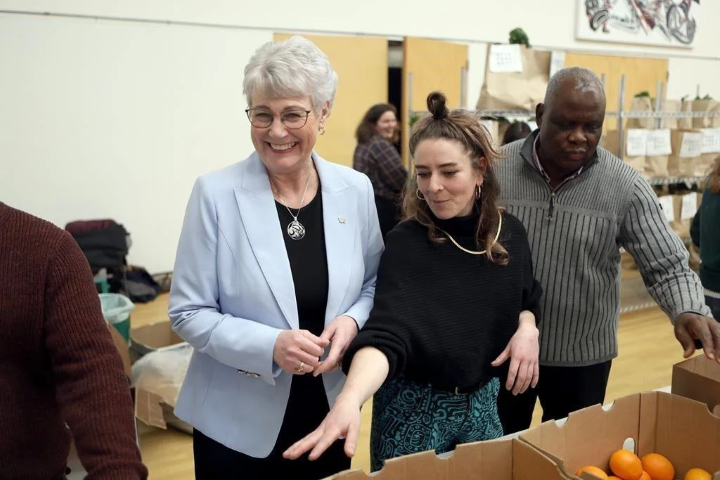
Finance Minister Katrine Conroy, left, is joined by food security coordinator Jesse Wallis and volunteer Vincent Aigbefo as they pack groceries for a subscription based program made up of volunteers called Good Food Box during a photo opportunity at the Fernwood Community Centre in Victoria, Wednesday, Feb. 21, 2024. THE CANADIAN PRESS/Chad Hipolito
Opinions on the 2024 British Columbia budget vary widely, reflecting divergent perspectives on its implications and priorities.
Finance Minister Katrine Conroy emphasizes the importance of maintaining government services and resisting deep cuts, warning that such measures could burden citizens with increased fees and reduced access to essential services.
Conroy defends the choice to increase the deficit, asserting that it was a necessary decision given the circumstances.
However, critics like Peter Milobar, BC United's finance critic, express concern about the substantial deficit, highlighting the absence of any mention of a record deficit during the budget announcement.
Sonia Furstenau, leader of the B.C. Green Party, criticizes the budget for lacking innovation and forward-thinking initiatives, accusing the government of neglecting its duty to create a sustainable future for children.
Kevin Falcon, the opposition leader, labels the budget as reckless and inflationary, arguing that it will exacerbate affordability challenges for families by driving up inflation across various sectors.
John Rustad, leader of the B.C. Conservative Party, condemns the budget as financially burdensome for future generations.
Ken Peacock, chief economist for the Business Council of British Columbia, questions the wisdom of running large deficits, particularly when the economy is nearing full capacity.
Fiona Famuluk, president of the B.C. Chamber of Commerce, raises concerns about servicing the budget's plans over the coming years, particularly regarding the deficit and debt numbers.
On a more positive note, Kristan Ash, executive director of the Midwives Association of B.C., expresses optimism about the budget's provision for free IVF treatment, anticipating its positive impact.
Meena Brisard, secretary-business manager for the Hospital Employees’ Union, applauds the budget's allocation of $13 billion in capital investments for health care system rebuilding over the next three years.
Torrance Coste, associate director of Wilderness Committee, emphasizes the need for stronger measures to address environmental challenges, criticizing the budget for insufficient action on reducing carbon emissions.
Bridgitte Anderson, president of the Greater Vancouver Board of Trade, welcomes relief for small businesses, particularly the adjustments to the Employer Health Tax threshold.
Sussanne Skidmore, president of BC Federation of Labour, underscores the importance of real wage increases and reduced household costs for low-wage workers.
Karen Ranalletta, CUPE BC president, appreciates the budget's support for public services, although expressing disappointment over funding to elite private schools and lack of investment in public transportation.
Chris Gardner, president of the Independent Contractors and Businesses Association, criticizes the budget for favoring traditional building trades unions, leading to overpayment for infrastructure projects.
Anita Huberman, president of the Surrey Board of Trade, expresses disappointment over the lack of funding for health care and education infrastructure in Surrey.
Coree Tull, co-chair of the BC Watershed Security Coalition, criticizes the budget for insufficient proactive funding to mitigate climate-fueled water disasters.
Clint Johnston, president of the BC Teachers’ Federation, expresses disappointment over the lack of substantial support for teachers and students, urging bold action to ensure adequate resources for education.















